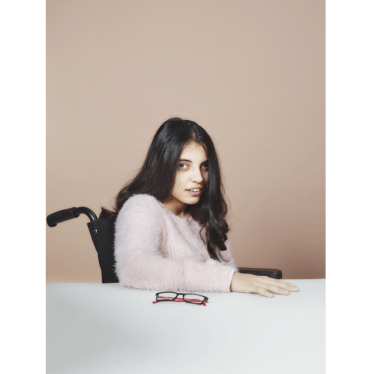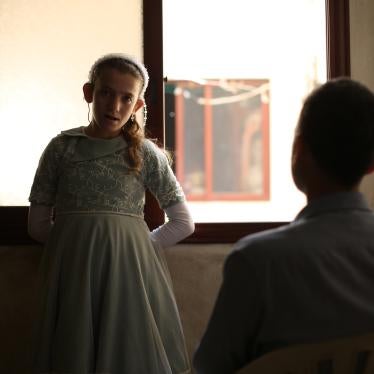Thank you, Mr. President.
Good afternoon, Mr. President, your Excellencies, Civil Society colleagues, Ladies, and Gentlemen,
My name is Nujeen Mustafa and I am 20 years old from Aleppo, Syria. I have cerebral palsy and use a wheelchair to move around. It is a privilege to share with you my insights on the humanitarian situation for people with disabilities in Syria.
I will start by posing a question: What does it mean to be a young woman person with a disability in Syria?
For me, it meant not being able to go to school, hang out with friends, or go to the cinema. It was almost like house arrest. Having a disability in Syria often means that you are hidden away. You confront shame, discrimination and physical barriers. You are pitied. I was fortunate, however: my family was very supportive. I didn't have so many fears.
That is, until the war started. I quickly realized that I was the main obstacle standing in the way of my family’s safety.
We lived in a tall building with no lift. If we needed to escape quickly, I would need to be carried down 5 flights of stairs.
For weeks, I heard military helicopters buzzing over our neighborhood ready to drop bombs at any moment. We went days with no sleep. My mother would carry me to the bathroom and stay there with me for hours until the bombs passed.
Every day, we would hear news of relatives and friends who had been killed. Every day, buildings in our neighborhood were bombed, leaving people trapped beneath the ruins. Every day, I feared that I could be the reason my family was one or two seconds too late. My brother called us the “walking dead.”
It took the bombing of a funeral in June 2015, where some of my relatives were killed, to convince our family it was time to flee our home and leave everything we knew behind.
In Syria, I didn’t have a wheelchair so I had to be carried out of the country by my siblings but many people with disabilities cannot depend on their families to help them reach safety. Often, because their family members have been killed or have already left.
Being a woman and having a disability makes it doubly more difficult. For example, a man can ask for help from a male friend to flee. But in a society like Syria, a woman cannot. If you don’t have an immediate male relative, you cannot just call on a friend to carry you.
While living in a country at war is daunting for anyone, it is particularly challenging for someone with a disability. The structure of supports that people with disabilities rely on is broken down during a conflict, leaving us at a higher risk of violence and with more difficulties in getting assistance - especially for women.
Many people with disabilities have developed different tricks for how to cope in daily life. For example, I had my independence in my home in Aleppo – I could easily reach my bed or the toilet, gracefully managing the two tricky steps up without anyone’s help. A blind person may know how to manage in her own environment, but can you imagine what it must be like to navigate the rubble and debris strewn across their path to safety?
Someone who is deaf might not realize that there are gunshots or warnings to evacuate, and may end up in danger. If you have an intellectual disability or psychosocial disability, leaving what is familiar behind can be very confusing and a source of great anxiety.
However you look at it, the risks are greater just because you have a disability.
This is why it’s so important and heartening that you, members of the UN Security Council, are taking the time to listen to the perspective of a young woman with a disability from Syria.
But this is not just my story – it is the experience of thousands of Syrians with disabilities who struggle to survive because of the limited services still functioning in the country, lack of accessibility, and the constant threat of violence, especially against women and girls.
And if you got a disability as a result of the conflict – which according to UNICEF accounts for 1.5 million people still living in Syria – you now face stigma and exclusion within your communities, and suddenly find yourself having to cope with having a disability.
Mr. President, Members of the Security Council, I would like to leave you with 3 insights:
1. The crisis in Syria has a disproportionately high impact on people with disabilities.
The use of landmines and cluster bombs has had devastating human consequences: Thousands of Syrians have lost limbs to these dreadful weapons that have rightly been banned by most governments because of their immense harm to civilians.
The conflict has had a significant psychological impact too. Even in my case, I still jump when I hear a loud noise, a reminder of those hours hiding out in the bathroom.
In the current situation in Idlib, there are more than 175,000 people with disabilities – many of whom now have disabilities because of the conflict. Residents fear military action because it could result in large casualties among civilians, given that Idlib is densely populated. The Council cannot allow Idlib to be another Aleppo, with hundreds of thousands forced to flee. Half of the people living in Idlib have already been displaced by war like my family, except this time they wouldn’t have anywhere to go.
All humanitarian programs – many of which are funded by governments around this table – should include specific programs to reach people with disabilities to ensure that they can get things like health services, assistive devices and psychosocial support. These are essential for people with disabilities to feel part of their communities and get back some sort of normalcy.
2. People with disabilities - like woman and girls - seem to be an afterthought.
The humanitarian response inside Syria and in neighboring countries largely overlooks the needs of people with disabilities. Independent organizations like Human Rights Watch have documented that people with disabilities cannot even access basic services, such as sanitation, health care, education – something I myself experienced when I fled. On my way to Germany, I didn’t find many accessible bathrooms along the way – and that’s especially hard for a woman.
There is very little data on how many people with disabilities live in Syria or have fled to neighboring countries and what our needs are. And without this data, the programs and policies just don’t meet our needs. We’re invisible.
People with disabilities were forgotten in times of peace. What do you think we expect in times of war? But that does not make it right.
But you need to count us because we count too.
UN agencies and humanitarian NGOs need to systematically collect data categorized by disability, age and gender - and monitor and report on people with disabilities, so that you understand the full impact of the conflict has on us. Otherwise, we continue to remain invisible.
The Security Council’s job is to protect ALL civilians – including people with disabilities. ‘No one left behind’ should not just be words that you say.
3. People with disabilities are a resource, not a burden.
We know best what risks we face and what we need, so ask for our input, involve us in aid planning, reach out to us to report on the challenges we face. “Nothing about us, without us.”
This means meaningful participation and representation of people with disabilities including women, and organizations of people with disabilities, in all parts of the Security Council’s work. I might be the first person with a disability to address the Council but I hope I won’t be the last.
Mr. President, Members of the Security Council,
this should not be just another meeting where we make grand statements and then move on to the next item on the agenda.
You can and should do more to ensure that people with disabilities are included in all aspects of your work - we can’t wait any longer.
I understand that there are many competing priorities in this conflict and the humanitarian response. But you need to address the needs of people with disabilities, particularly women. This is not a favor. This is not charity. This is our rights.
I’m very grateful for the chance to brief you.
My hope is that people with disabilities, particularly women and girls, would one day live in a world that protects, respects and values us.
Thank you.








